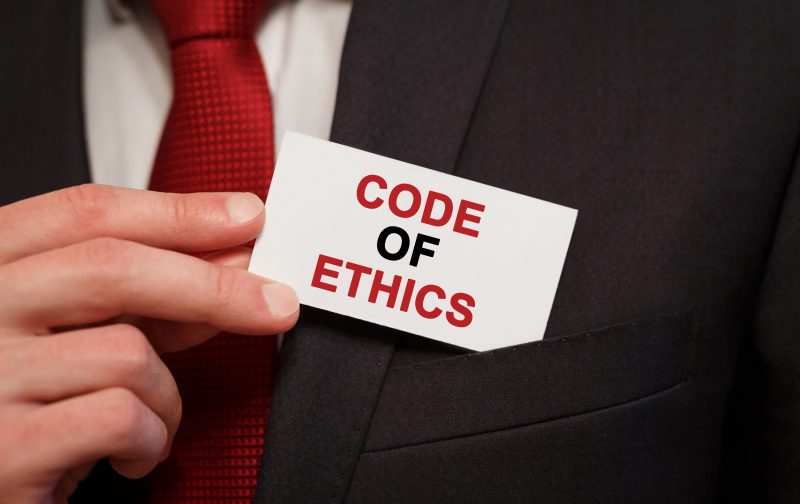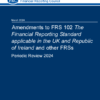
by John McCarthy Consulting Ltd. | Oct 1, 2019 | Blog, News
In July, the Financial Reporting Council (FRC) in London issued a consultation on proposed changes to the UK’s Ethical and Auditing Standards. It closed on September 27, 2019.
The consultation is expected to introduce revisions that will see tougher regulations on audit independence and the provision of non-audit services. Any changes that are approved will come into effect for audits of accounting periods commencing on/after 15 December 2019.
The date these changes may come into effect in Ireland is at present, unclear. Coming up to a 31 December 2019 period end, auditors are expected to be aware of the changes that may impact audits being due to be performed in 2020, before they accept or commence an assignment, so that they can properly accept or reject the audit appointment having checked the independence rules.
The aim of these changes is to place greater emphasis and focus on ethical matters and the public interest within audit firms, and to require reporting where an audit firm does not follow the ethics partner’s advice. This will be achieved by increasing the authority of the ethics partner function within audit firms.
What does this mean for Ethical and Auditing Standards in Ireland?
The IAASA has confirmed that following the FRC consultation, they will review the proposed changes and in due course, will issue a public consultation specific to Irish Standards, that will reflect the changes proposed by the FRC in the UK.
This will likely bring a change to both audit and ethical standards in Ireland.
What will the key changes be?
- A more robust, ‘reasonably informed third-party’ (RITP) test that is ‘objective’ and ‘reasonable’;
- The test would require audit firms to evaluate the effect a proposed action would have on their independence – from the perspective of public interest stakeholders;
- This test would be supported by further material, designed to encourage a more comprehensive assessment considering the spirit and letter of the standard;
- Further detailed amendments to individual standards to clarify what the auditor’s responsibilities are:
- when considering whether or not, the bodies they have audited are compliant with relevant laws and regulations
- when checking there are no material misstatements in the ‘other information’ companies include in their annual financial reports;
- Potential ban on gifts and hospitality both being received and given;
- Potential change to the definition of ‘accounting services’ where it might involve ‘playing the role of management or initiating transactions’; and an
- Absolute prohibition is proposed on the provision of internal audit services, and recruitment services to an audited entity by the auditor of that entity. And its proposed to simplify and clarify the prohibitions on the provision of Information Technology Systems.
Why would a UK change affect Irish audit standards?
Since June 2016, Ireland has had to write its own audit standards. However, they remain very similar to the FRC’s Auditing Framework as it is IAASA policy to make ‘minimal amendments to the UK framework’.
Amendments are most often only made to specify ‘Irish’ rather than ‘UK’ company law, or to remove a conflict with Irish or EU law, or differences in Irish or UK markets. In this way, whatever changes are made in the UK, Ireland is likely to follow suit.
Who writes the Irish accounting standards?
The Financial Reporting Council in London still currently write accounting standards for both the UK and Ireland. Until Brexit, the FRC will continue to write Irish accounting standards – FRS 102 being the main one. Rumour has it that the Financial Reporting Council can’t wait to get rid of FRS 105 the standard for Micro Entities, once Brexit occurs.
Post Brexit, Ireland may have to write their own accounting standards, but capacity-wise, this is a potential problem as FRS 102, for example took ten years to develop!
Support materials
There are 19 webinars on various topics, include ethics and an audit update, on our website – €45 each, or you may purchase two at the same time for €80 or five for €190.
All our webinars are accessible at any time (for 12 months from date of purchase) here.
We have also prepared, ready to use, several engagement and representation letter templates (in Word format) for many types of assignment, which help reduce misunderstandings about engagement scope and liability. These are available to purchase online (bulk purchases of 5 or more templates attract a 20% discount), please click on the relevant links.
Some latest additions may be of interest to you:

by John McCarthy Consulting Ltd. | Jul 29, 2019 | Blog, News
The Criminal Justice (Money Laundering and Terrorist Financing) Acts, 2010 to 2018 requires firms to report suspicious transactions based on the premise that a person ‘knows, suspects or has reasonable grounds to suspect, based on information obtained in the course of carrying on business as designated person’ that another person is involved in money laundering or terrorist financing. This is quite a low bar, as neither proof nor documentary evidence is required.
Suspicious Transaction Reports (STRs) are made internally within the accountancy firm to the Money Laundering Reporting Officer (MLRO) who is the only person designated by the legislation within the firm who may make an external report.
The external report is made the Garda Síochana online at GoAML and is copied to the Revenue Commissioners by post, even if it does not involve taxation.
More details on the reporting requirements are set out in our newly published AML Policies & Procedures Manual, which is available here.
It is fully updated for the Criminal Justice (Money Laundering and Terrorist Financing) Acts, 2010 to 2018 which came into force on 26 November 2018. It retails at €150+VAT.
As regards fulfilling the training requirement, see our on-demand webinars on AML, accessible at any time.
Other webinar topics include Investment Property Accounting, FRS 105, Common Errors in FRS 102 Accounting and the latest on FRS 105 and company law, visit our online webinar training website. Once viewing is completed, customers will receive a CPD Certificate confirming their learning.

by John McCarthy Consulting Ltd. | Jul 23, 2019 | Blog, News
The Criminal Justice (Money Laundering and Terrorist Financing) Acts, 2010 to 2018 updates the 2010 legislation that was already in place. Among other things it is essential to arrange staff training with all members of your team to ensure they are up to date with the latest changes.
It is also vital to have an up to date set of written AML Policies Controls & Procedures. This written document must include the following:
- Procedures for recordkeeping, staff training and the maintenance of appropriate policies, procedures and controls about the obligations imposed by the legislation;
- Procedures about the Register of Beneficial Owners (RBO) – with effect from a date to be announced later in 2019, each corporate entity and Industrial and Provident Societies in Ireland are obliged to maintain a register and file certain details with the Central Register of Beneficial Ownership of Companies and Industrial and Provident Societies at the CRO.
The website of the RBO is https://rbo.gov.ie/. Entities are also obliged to keep the beneficial ownership information up to date with the RBO at all times. The penalty for not doing so is a Class A fine, which is currently set at €5,000.
More details on these requirements are set out in Appendices III and IV of our newly published AML Policies & Procedures Manual, which is available here.
It is fully updated for the Criminal Justice (Money Laundering and Terrorist Financing) Acts, 2010 to 2018 which came into force on 26 November 2018. It retails at €150+VAT.
As regards fulfilling the training requirement, see our on-demand webinars on AML, accessible at any time.
Other webinar topics include Investment Property Accounting, FRS 105, Common Errors in FRS 102 Accounting and the latest on FRS 105 and company law, visit our online webinar training website. Once viewing is completed, customers will receive a CPD Certificate confirming their learning.

by John McCarthy Consulting Ltd. | Jul 16, 2019 | Blog, News
The Criminal Justice (Money Laundering and Terrorist Financing) Acts, 2010 to 2018 places some important obligations on accountants to carry out AML procedures, among them the following:
- The obligation to identify and take risk-based and adequate measures to verify, where applicable, the Directors and beneficial owners of client entities;
- The application of the Client Due Diligence (CDD) on a risk-based approach to provide for a proportionate allocation of resources in the fight against money laundering and the financing of terrorism;
- In line with the risk-based approach, the legislation sets out when standard (Normal Due Diligence – NDD), enhanced (Enhanced Due Diligence – EDD) and simplified client due diligence (Simplified Due Diligence – SDD) procedures should be applied to specified client types;
- Designated persons are permitted to rely on third parties to meet the CDD requirements. The obligation for ongoing monitoring of compliance with the full CDD obligation still resides with the designated person;
- Designated persons covered by the Legislation are obliged to promptly report suspicions of money laundering or terrorist financing simultaneously to the Gardaí and Revenue Commissioners;
It is essential that the correct procedures are followed when applying these rules. More on this is available in our new fully updated AML Policies & Procedures Manual, which is available here.
It is fully updated for the Criminal Justice (Money Laundering and Terrorist Financing) Acts, 2010 to 2018 which came into force on 26 November 2018. It retails at €150+VAT.
See also our on-demand webinars on AML, accessible at any time.
Other webinar topics include Investment Property Accounting, FRS 105, Common Errors in FRS 102 Accounting and the latest on FRS 105 and company law, visit our online webinar training website. Once viewing is completed, customers will receive a CPD Certificate confirming their learning.

by John McCarthy Consulting Ltd. | Jul 8, 2019 | Blog, News
Certain circumstances can arise from time to time when an accountant (as well as certain other designated persons) is allowed to rely on the privilege reporting exemption contained in Section 46 of the Criminal Justice (Money Laundering and Terrorist Financing) Acts, 2010 to 2018.
The effect of this exemption, when properly applied, is that no suspicious transaction report (STR) is made.
It is essential that the correct protocols are followed when relying on this exemption, and more on this is available in our new fully updated AML Policies & Procedures Manual, which is now available here.
It is fully updated for the Criminal Justice (Money Laundering and Terrorist Financing) Acts, 2010 to 2018 which came into force on 26 November 2018. It retails at €150+VAT.
See also our on-demand webinars on AML, accessible at any time.
Other webinar topics include Investment Property Accounting, FRS 105, Common Errors in FRS 102 Accounting and the latest on FRS 105 and company law, visit our online webinar training website. Once viewing is completed, customers will receive a CPD Certificate confirming their learning.










